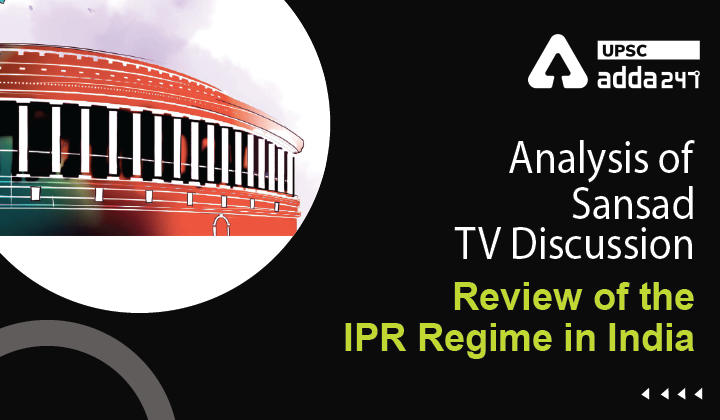Table of Contents
Analysis Of Sansad TV Discussion
”Review of the IPR Regime in India”
Relevance
”GS 2: Parliament, Indian Constitution, Executive”
Context
The Parliamentary Standing Committee on Commerce under the chairmanship of Rajya Sabha MP Mr Vijayasai Reddy submitted its report on the subject ‘Review of the Intellectual Property Rights (IPR) Regime in India’.
Background
This is the 169th report which reflect actions taken by the government on the recommendations of the committee in its 161st report on ”Review of the Intellectual Property Rights Regime”
About IPR
- Intellectual Property Rights are the rights given to persons over the creations of their minds and are critical in fostering innovation and creativity.
- Hence, the rights provide the creator or innovator with an exclusive right over the use of his/her creation for a certain period of time
Increased Significance of IPR Regime
- The strengthening of the IPR regime has gained further significance in light of the Government’s focus on ‘Make in India’ and ‘Atmanirbhar Bharat.
- Also, the power of innovation leveraged by IPR has been amply demonstrated during the ongoing Covid-19 pandemic, particularly in the medical and health sectors.
Key Observations & Recommendations of the Committee
Key Points |
Key Observations |
Key Recommendations |
| Role of IPR | The Committee noted that an improvement in protection of IPR increases Foreign Direct Investment (FDI) and inflow of foreign exchange. | India should improve IPR protection as an improvement of 1% in protection of copyrights increases FDI by 6.8%. |
| Investment in R&D | The Committee noted that India grants a low number of patents (as compared to China and the USA), which can be attributed to low spending on research and development (0.7% of the GDP). | It recommended: (i) allocating funds to each government Departments for research, (ii) providing incentives to private companies for undertaking research, and (iii) directing large industries to give Corporate Social Responsibility funds for research. |
| Encouraging IPR | The Committee noted that only 36% of patents filed in India are filed by domestic entities. It attributed this to lack of awareness of IPR. | It recommended the Department for Promotion of Industry and Internal Trade (DPIIT) to increase awareness among small businesses, artisans, and establishments in remote areas with participation of non-governmental organisation. |
| National IPR Policy, 2016 | The Policy was adopted to provide the legal and administrative framework to manage IPR | The Committee recommended its re-assessment in light of new trends in innovation and to identify challenges in implementation of the policy. It suggested involving state governments in framing IPR policies. |
| IP Financing | The Committee noted that the use of IP backed financing (use of IP to gain financial benefits, credit or revenue) can enhance financial innovation, availability of credit, and increase capital base. | It recommended: (i) amending the Insurance Act, 1938 to minimise monetary risks from infringement of IPR, (ii) devising a uniform system of valuation of IP, (iii) enacting legislation to protect and determine standards for financing, and (iv) adopting risk-sharing policies with companies. |
| IP Appellate Board | The Committee noted that the Board had dealt with complex issues on IPR disputes and financing efficiently. | It recommended reforms in the Board, including greater structural autonomy, infrastructural and administrative reforms, and timely appointment of officials and manpower. |
| Regulation | It observed that a separate framework for protecting trade secrets is not there. | The Committee recommended changes to: (i) the Patent Act, 1970, (ii) the Trademarks Act, 1999, and (iii) the Copyright Act, 1957. |
| COVID-19 | During worst Covid situations, India faced delays in invoking compulsory licenses on crucial drugs and vaccines in emergency like situations. | The Committee recommended waiving off patent rights for COVID-19 related drugs and vaccines temporarily, to address inadequate availability. |
| Counterfeiting and piracy | No stringent law on this issue. | The Committee recommended: (i) implementation of stringent legislation through strong inter-Departmental coordination, (ii) increasing the capacity of enforcement agencies (such as IPR cells in the state police), and (iii) establishing a method to estimate revenue loss from it. |



 TSPSC Group 1 Question Paper 2024, Downl...
TSPSC Group 1 Question Paper 2024, Downl...
 TSPSC Group 1 Answer key 2024 Out, Downl...
TSPSC Group 1 Answer key 2024 Out, Downl...
 UPSC Prelims 2024 Question Paper, Downlo...
UPSC Prelims 2024 Question Paper, Downlo...




